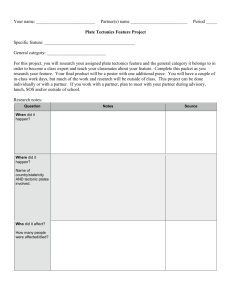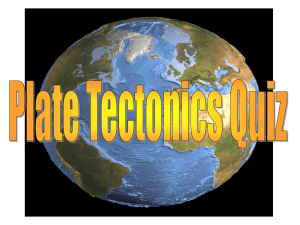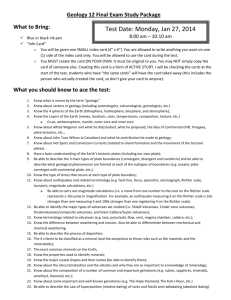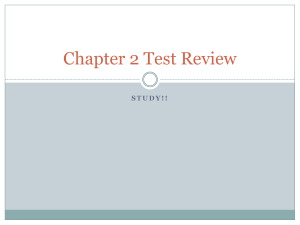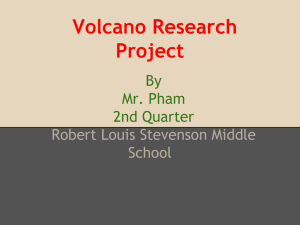Plate Motion Research
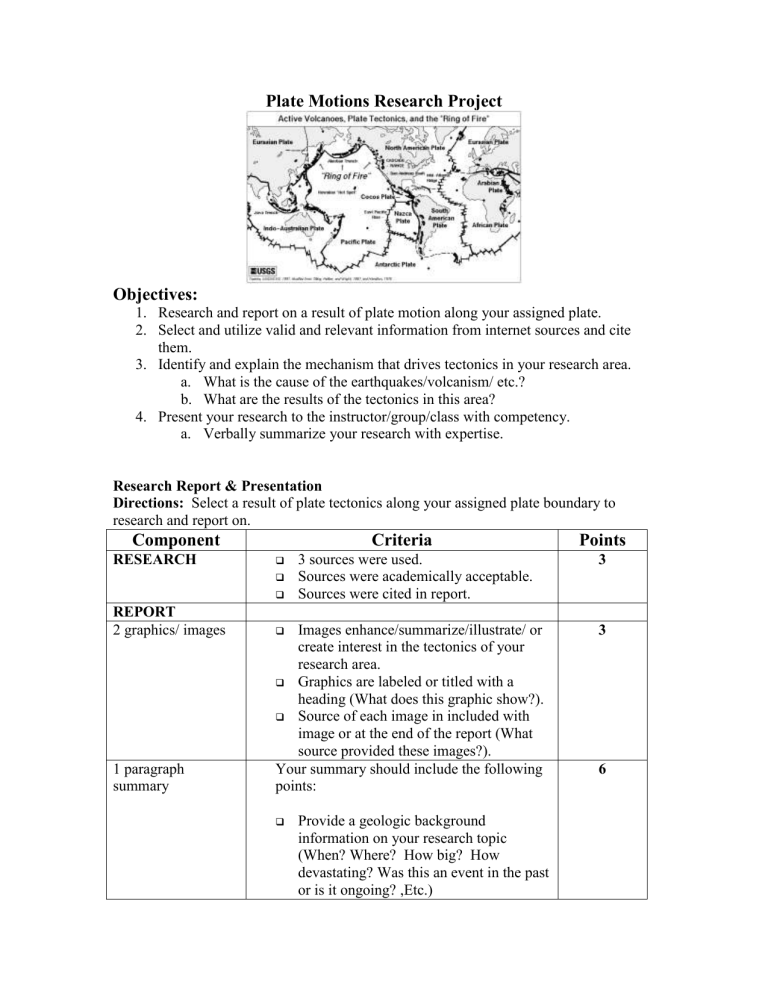
Plate Motions Research Project
Objectives:
1.
Research and report on a result of plate motion along your assigned plate.
2.
Select and utilize valid and relevant information from internet sources and cite them.
3.
Identify and explain the mechanism that drives tectonics in your research area. a.
What is the cause of the earthquakes/volcanism/ etc.? b.
What are the results of the tectonics in this area?
4.
Present your research to the instructor/group/class with competency. a.
Verbally summarize your research with expertise.
Research Report & Presentation
Directions: Select a result of plate tectonics along your assigned plate boundary to research and report on.
Component
RESEARCH
Criteria
3 sources were used.
Sources were academically acceptable.
Sources were cited in report.
Points
3
REPORT
2 graphics/ images 3
1 paragraph summary
Images enhance/summarize/illustrate/ or create interest in the tectonics of your research area.
Graphics are labeled or titled with a heading (What does this graphic show?).
Source of each image in included with image or at the end of the report (What source provided these images?).
Your summary should include the following points:
6
Provide a geologic background information on your research topic
(When? Where? How big? How devastating? Was this an event in the past or is it ongoing? ,Etc.)
Identify and describe the specific plate motion that is responsible for tectonics in your research area. Use relevant terms from class in your explanation.
PRESENTATION
Why should people care? Why is this of interest or importance to people?
Summarize research to instructor, group, or class with competency.
It should be apparent that you understand your research. You should be able to answer questions about your research.
Information should be conveyed with confidence and clarity.
6
TOTAL
/18
Basic Plate Motions www.platetectonics.com/book/page_5.asp
http://whatonearth.olehnielsen.dk/Tectonics.asp
Earthquake List (USGS) http://earthquake.usgs.gov/earthquakes/eqarchives/
Recent Earthquakes (USGS) http://earthquake.usgs.gov/
2011 Significant Earthquake List (USGS) http://earthquake.usgs.gov/earthquakes/eqinthenews/
Earthquakes of interest (USGS) http://earthquake.usgs.gov/earthquakes/world/historical.php
Suggestions for Research: These websites are to be used a starting point. You will need to expand your search and learn more.
North American Plate
Alaska’s Redoubt Volcano http://geology.com/volcanoes/redoubt/
Alaskan Earthquake of 1964 http://www.aeic.alaska.edu/quakes/Alaska_1964_earthquake.html
Iceland’s Glacio-volcanoes: Volcanoes under ice http://geology.com/press-release/glaciovolcanoes/
Iceland’s Eyjafjallajökull volcano (Recent eruptions have disrupted air travel) http://geology.com/press-release/iceland-volcano-monitoring/
Krafla Volcano, Iceland http://geology.com/press-release/geothermal-at-krafla-volcano/ www.platetectonics.com/book/page_10.asp
Geothermal Energy in Iceland http://iceland.vefur.is/iceland_nature/geology_of_iceland/geothermal_heat.htm
San Andreas Fault, California http://www.platetectonics.com/book/page_15.asp
1989 World Series Earthquake, San Francisco http://www.classzone.com/books/earth_science/terc/content/investigations/es1003/es1003page01.cfm
Mt. Saint Helens, Washington http://www.platetectonics.com/book/page_3.asp
http://www.fs.fed.us/gpnf/volcanocams/msh/
Caribbeaan/Cocos Plates
Santa Maria Volcano in Guatemala http://geology.com/volcanoes/santa-maria/
South American Plate & Nasca Plate
Colombia’s most active volcano: Galeras http://geology.com/volcanoes/galeras/
The growth of the Andes http://geology.com/press-release/age-of-the-andes-mountains/
Pacific Plate
Japan’s Tsunami http://serc.carleton.edu/NAGTWorkshops/visualization/collections/japan2011.html
http://www.livescience.com/13187-japan-earthquake-tsunami-science-faq.html
http:// www.thelayeredearth.com/teachable.html
Mt. Pinatubo Volcanic Eruption Philippines http://pubs.usgs.gov/fs/1997/fs113-97/ http://vulcan.wr.usgs.gov/Volcanoes/Philippines/Pinatubo/framework.html
Mexico
El Chichon Volcano http://www.volcanodiscovery.com/volcanoes/mexico/el_chichon/
Indonesia –
Indonesian Volcanoes
http://vulcan.wr.usgs.gov/Volcanoes/Indonesia/framework.html
Mt. Tibor Eruption that caused “The Year Without a Summer” http://www.yourdiscovery.com/earth/year_without_summer/intro/index.shtml
Indonesia – Sumatra (Christmas) 2006 Tsunami http://tectonics.caltech.edu/outreach/highlights/sumatra/
Why Sumatra 2006 Eqrthquake was so deadly (Christmas 2006) http://geology.com/press-release/sumatra-earthquake-sediments/
Sulfur Mines in Indonesia http://www.boston.com/bigpicture/2010/12/kawah_ijen_by_night.html
http://www.bbc.co.uk/news/world-asia-pacific-12301421
Krakatoa Eruption http://www.geology.sdsu.edu/how_volcanoes_work/Krakatau.html
African Plate
The Rift Valley http://geology.com/articles/east-africa-rift.shtml
Carbonate Volcanoes of the Rift Valley (Rare volcanoes with black lava) http://geology.com/press-release/carbonatite-lava-at-oldoinyo-lengai/
Arabian Plate
Turkey’s Anatolian Fault – Source of large Earthquakes http://www.livescience.com/16688-turkey-earthquake-explained.html
Austrialian Plate
Plate Tectonics of New Zealand http://globalrumblings.blogspot.com/2011/02/earthquakesplate-tectonicschristchurch.html
Eurasian Plate
Italy
Mt. Vesuvius (Pompeii): http://geology.com/volcanoes/vesuvius/
Mt. Etna, Volcano in Italy http://geology.com/volcanoes/etna/
Greece
Santorini the Atlantis connection http://www.geology.sdsu.edu/how_volcanoes_work/santorini.html
Indian Plate
The Himalayas (USGS): http://pubs.usgs.gov/gip/dynamic/himalaya.html
History of the Himalayas http://www.platetectonics.com/book/page_11.asp
